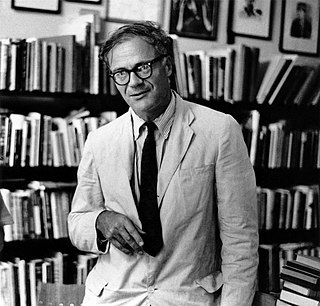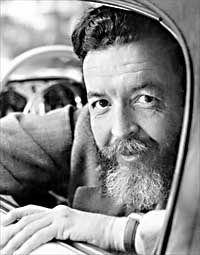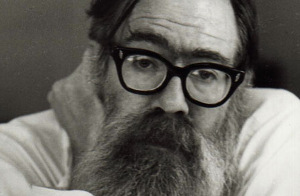Related Research Articles

Elizabeth Bishop was an American poet and short-story writer. She was Consultant in Poetry to the Library of Congress from 1949 to 1950,the Pulitzer Prize winner for Poetry in 1956,the National Book Award winner in 1970,and the recipient of the Neustadt International Prize for Literature in 1976. Dwight Garner argued that she was perhaps "the most purely gifted poet of the 20th century".

Robert Traill Spence Lowell IV was an American poet. He was born into a Boston Brahmin family that could trace its origins back to the Mayflower. His family,past and present,were important subjects in his poetry. Growing up in Boston also informed his poems,which were frequently set in Boston and the New England region. The literary scholar Paula Hayes believes that Lowell mythologized New England,particularly in his early work.
Confessional poetry or "Confessionalism" is a style of poetry that emerged in the United States during the late 1950s and early 1960s. It is sometimes classified as a form of Postmodernism. It has been described as poetry of the personal or "I",focusing on extreme moments of individual experience,the psyche,and personal trauma,including previously and occasionally still taboo matters such as mental illness,sexuality,and suicide,often set in relation to broader social themes.

Randall Jarrelljə-REL was an American poet,literary critic,children's author,essayist,and novelist. He was the 11th Consultant in Poetry to the Library of Congress—a position that now bears the title Poet Laureate of the United States.

Michael Dana Gioia is an American poet,literary critic,literary translator,and essayist.

Donald Rodney Justice was an American teacher of writing and poet who won the Pulitzer Prize for Poetry in 1980.

Frank Bidart is an American academic and poet,and a winner of the Pulitzer Prize for Poetry.
Franz Wright was an American poet. He and his father James Wright are the only parent/child pair to have won the Pulitzer Prize in the same category.

John Allyn McAlpin Berryman was an American poet and scholar. He was a major figure in American poetry in the second half of the 20th century and is considered a key figure in the "confessional" school of poetry. His best-known work is The Dream Songs.
New Formalism is a late 20th- and early 21st-century movement in American poetry that has promoted a return to metrical,rhymed verse and narrative poetry on the grounds that all three are necessary if American poetry is to compete with novels and regain its former popularity among the American people.
Timothy Steele is an American poet,who generally writes in meter and rhyme. His early poems,which began appearing in the 1970s in such magazines as Poetry,The Southern Review,and X. J. Kennedy's Counter/Measures,are said to have anticipated and contributed to the revival of traditional verse associated with the New Formalism. He,however,has objected to being called a New Formalist,saying that he doesn't claim to be doing anything technically novel and that Formalism "suggests,among other things,an interest in style rather than substance,whereas I believe that the two are mutually vital in any successful poem." Notwithstanding his reservations about the term,Steele's poetry is more strictly "formal" than the work of most New Formalists in that he rarely uses inexact rhymes or metrical substitutions,and is sparing in his use of enjambment.
Alicia Elsbeth Stallings is an American poet,translator,and essayist.
Henry Hart is the Hickman Professor of Humanities at the College of William and Mary in Williamsburg,Virginia. In addition to three books of poetry he has written critical works on such poets as Seamus Heaney,Geoffrey Hill,and Robert Lowell. He edited The James Dickey Reader (1999) and his biography James Dickey:The World as a Lie (2000),was a finalist in nonfiction for the Southern Book Critics Circle Award. He also edited The Wadsworth Themes in American Literature Series (2009). (2009) His poems and essays have appeared in The New Yorker,Poetry,Kenyon Review,Southern Review,Sewanee Review,Denver Quarterly,and numerous other journals. Hart was a founding editor of Verse,an international poetry journal. In 2010,he won the Carole Weinstein Prize for Poetry. On July 2,2018,he was sworn in as the 17th Poet Laureate of Virginia in the commonwealth's capital of Richmond.

William Stanley Beaumont Braithwaite was an African-American writer,poet,literary critic,anthologist,and publisher in the United States. His work as a critic and anthologist was widely praised and important in the development of East Coast poetry styles in the early 20th century. He was awarded the Spingarn Medal in 1918.
Geoffrey Brock is an American poet and translator. Since 2006 he has taught creative writing and literary translation at the University of Arkansas,where he is Distinguished Professor of English.

Eleanor Ross Taylor was an American poet who published six collections of verse from 1960 to 2009. Her work received little recognition until 1998,but thereafter received several major poetry prizes. Describing her most recent poetry collection,Kevin Prufer writes,"I cannot imagine the serious reader —poet or not —who could leave Captive Voices unmoved by the work of this supremely gifted poet who skips so nimbly around our sadnesses and fears,never directly addressing them,suggesting,instead,their complex resistance to summary."
Adam Kirsch is an American poet and literary critic. He is on the seminar faculty of Columbia University's Center for American Studies,and has taught at YIVO.
Alfred Corn is an American poet and essayist.
Christian Wiman is an American poet,translator and editor. Raised in the small west Texas town of Snyder,he graduated from Washington and Lee University and has taught at Northwestern University,Stanford University,Lynchburg College in Virginia,and the Prague School of Economics. In 2003,he became editor of the oldest American magazine of verse,Poetry,a role he stepped down from in June 2013. Wiman is now on the faculty of Yale University,where he teaches courses on Religion and Literature at Yale Divinity School and the Yale Institute of Sacred Music.
References
- ↑ McHenry, Eric (January 28, 2002). "Poetry's cruelest and guiltiest pleasure". Slate Magazine. Retrieved December 5, 2021.
- 1 2 Foundation, Poetry (December 5, 2021). "William Logan". Poetry Foundation. Retrieved December 5, 2021.
- ↑ Ford, Mark. "Samurai Critic." The New York Times Book Review. April 4, 2009
- ↑ See W. Logan's "Chronicles" columns in The New Criterion magazine.
- ↑ Logan, William (April 5, 2014). Guilty Knowledge, Guilty Pleasure: The Dirty Art of Poetry. Columbia University Press. ISBN 9780231537230 . Retrieved December 5, 2021.